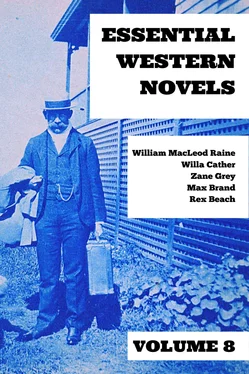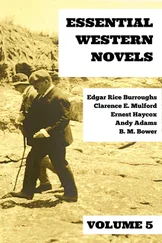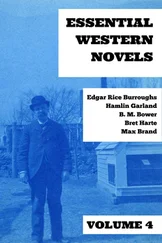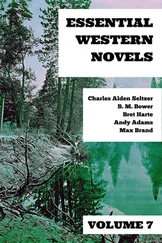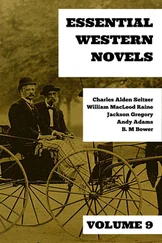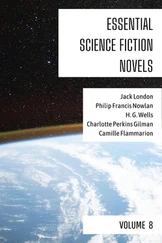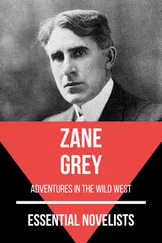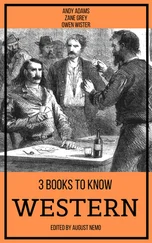Zane Grey - Essential Western Novels - Volume 8
Здесь есть возможность читать онлайн «Zane Grey - Essential Western Novels - Volume 8» — ознакомительный отрывок электронной книги совершенно бесплатно, а после прочтения отрывка купить полную версию. В некоторых случаях можно слушать аудио, скачать через торрент в формате fb2 и присутствует краткое содержание. Жанр: unrecognised, на английском языке. Описание произведения, (предисловие) а так же отзывы посетителей доступны на портале библиотеки ЛибКат.
- Название:Essential Western Novels - Volume 8
- Автор:
- Жанр:
- Год:неизвестен
- ISBN:нет данных
- Рейтинг книги:4 / 5. Голосов: 1
-
Избранное:Добавить в избранное
- Отзывы:
-
Ваша оценка:
- 80
- 1
- 2
- 3
- 4
- 5
Essential Western Novels - Volume 8: краткое содержание, описание и аннотация
Предлагаем к чтению аннотацию, описание, краткое содержание или предисловие (зависит от того, что написал сам автор книги «Essential Western Novels - Volume 8»). Если вы не нашли необходимую информацию о книге — напишите в комментариях, мы постараемся отыскать её.
Essential Western Novels - Volume 8 — читать онлайн ознакомительный отрывок
Ниже представлен текст книги, разбитый по страницам. Система сохранения места последней прочитанной страницы, позволяет с удобством читать онлайн бесплатно книгу «Essential Western Novels - Volume 8», без необходимости каждый раз заново искать на чём Вы остановились. Поставьте закладку, и сможете в любой момент перейти на страницу, на которой закончили чтение.
Интервал:
Закладка:
Turning to view the interior, we see the same picture of change. When the Superintendent of the Census in 1890 declared the frontier line no longer traceable, the beginning of the rush into Oklahoma had just occurred. Here where the broken fragments of Indian nations from the East had been gathered and where the wilder tribes of the Southwest were being settled, came the rush of the land-hungry pioneer. Almost at a blow the old Indian territory passed away, populous cities came into being and it was not long before gushing oil wells made a new era of sudden wealth. The farm lands of the Middle West taken as free homesteads or bought for a mere pittance, have risen so in value that the original owners have in an increasing degree either sold them in order to reinvest in the newer cheap lands of the West, or have moved into the town and have left the tillage to tenant farmers. The growth of absentee ownership of the soil is producing a serious problem in the former centers of the Granger and the Populist. Along the Old Northwest the Great Lakes are becoming a new Mediterranean Sea joining the realms of wheat and iron ore, at one end with the coal and furnaces of the forks of the Ohio, where the most intense and wide-reaching center of industrial energy exists. City life like that of the East, manufactures and accumulated capital, seem to be reproducing in the center of the Republic the tendencies already so plain on the Atlantic Coast.
Across the Great Plains where buffalo and Indian held sway successive industrial waves are passing. The old free range gave place to the ranch, the ranch to the homestead and now in places in the arid lands the homestead is replaced by the ten or twenty acre irrigated fruit farm. The age of cheap land, cheap corn and wheat, and cheap cattle has gone forever. The federal government has undertaken vast paternal enterprises of reclamation of the desert.
In the Rocky Mountains where at the time of Civil War, the first important rushes to gold and silver mines carried the frontier backward on a march toward the east, the most amazing transformations have occurred. Here, where prospectors made new trails, and lived the wild free life of mountain men, here where the human spirit seemed likely to attain the largest measure of individual freedom, and where fortune beckoned to the common man, have come revolutions wrought by the demand for organized industry and capital. In the regions where the popular tribunal and the free competitive life flourished, we have seen law and order break down in the unmitigated collision of great aggregations of capital, with each other and with organized socialistic labor. The Cripple Creek strikes, the contests at Butte, the Goldfield mobs, the recent Colorado fighting, all tell a similar story,—the solid impact of contending forces in regions where civic power and loyalty to the State have never fully developed. Like the Grand Cañon, where in dazzling light the huge geologic history is written so large that none may fail to read it, so in the Rocky Mountains the dangers of modern American industrial tendencies have been exposed.
As we crossed the Cascades on our way to Seattle, one of the passengers was moved to explain his feeling on the excellence of Puget Sound in contrast with the remaining visible Universe. He did it well in spite of irreverent interruptions from those fellow travelers who were unconverted children of the East, and at last he broke forth in passionate challenge, "Why should I not love Seattle! It took me from the slums of the Atlantic Coast, a poor Swedish boy with hardly fifteen dollars in my pocket. It gave me a home by the beautiful sea; it spread before my eyes a vision of snow-capped peaks and smiling fields; it brought abundance and a new life to me and my children and I love it, I love it! If I were a multi-millionaire I would charter freight cars and carry away from the crowded tenements and noisome alleys of the eastern cities and the Old World the toiling masses, and let them loose in our vast forests and ore-laden mountains to learn what life really is!" And my heart was stirred by his words and by the whirling spaces of woods and peaks through which we passed.
But as I looked and listened to this passionate outcry, I remembered the words of Talleyrand, the exiled Bishop of Autun, in Washington's administration. Looking down from an eminence not far from Philadelphia upon a wilderness which is now in the heart of that huge industrial society where population presses on the means of life, even the cold-blooded and cynical Talleyrand, gazing on those unpeopled hills and forests, kindled with the vision of coming clearings, the smiling farms and grazing herds that were to be, the populous towns that should be built, the newer and finer social organization that should there arise. And then I remembered the hall in Harvard's museum of social ethics through which I pass to my lecture room when I speak on the history of the Westward movement. That hall is covered with an exhibit of the work in Pittsburgh steel mills, and of the congested tenements. Its charts and diagrams tell of the long hours of work, the death rate, the relation of typhoid to the slums, the gathering of the poor of all Southeastern Europe to make a civilization at that center of American industrial energy and vast capital that is a social tragedy. As I enter my lecture room through that hall, I speak of the young Washington leading his Virginia frontiersmen to the magnificent forest at the forks of the Ohio. Where Braddock and his men, "carving a cross on the wilderness rim," were struck by the painted savages in the primeval woods, huge furnaces belch forth perpetual fires and Huns and Bulgars, Poles and Sicilians struggle for a chance to earn their daily bread, and live a brutal and degraded life. Irresistibly there rushed across my mind the memorable words of Huxley:
"Even the best of modern civilization appears to me to exhibit a condition of mankind which neither embodies any worthy ideal nor even possesses the merit of stability. I do not hesitate to express the opinion that, if there is no hope of a large improvement of the condition of the greater part of the human family; if it is true that the increase of knowledge, the winning of a greater dominion over Nature, which is its consequence, and the wealth which follows upon that dominion, are to make no difference in the extent and the intensity of Want, with its concomitant physical and moral degradation, among the masses of the people, I should hail the advent of some kindly comet, which would sweep the whole affair away, as a desirable consummation."
But if there is disillusion and shock and apprehension as we come to realize these changes, to strong men and women there is challenge and inspiration in them too. In place of old frontiers of wilderness, there are new frontiers of unwon fields of science, fruitful for the needs of the race; there are frontiers of better social domains yet unexplored. Let us hold to our attitude of faith and courage, and creative zeal. Let us dream as our fathers dreamt and let us make our dreams come true.
"Daughters of Time, the hypocritic days,Muffled and dumb like barefoot dervishes,And marching single in an endless file,Bear diadems and fagots in their hands.To each they offer gifts after his willBread, kingdoms, stars, and sky that hold them all.I, in my pleachéd garden watched the pomp,Forgot my morning wishes, hastilyTook a few herbs and apples and the dayTurned and departed silent. I, too late,Under her solemn fillet, saw the scorn!"
What were America's "morning wishes"? From the beginning of that long westward march of the American people America has never been the home of mere contented materialism. It has continuously sought new ways and dreamed of a perfected social type.
In the fifteenth century when men dealt with the New World which Columbus found, the ideal of discovery was dominant. Here was placed within the reach of men whose ideas had been bounded by the Atlantic, new realms to be explored. America became the land of European dreams, its Fortunate Islands were made real, where, in the imagination of old Europe, peace and happiness, as well as riches and eternal youth, were to be found. To Sir Edwin Sandys and his friends of the London Company, Virginia offered an opportunity to erect the Republic for which they had longed in vain in England. To the Puritans, New England was the new land of freedom, wherein they might establish the institutions of God, according to their own faith. As the vision died away in Virginia toward the close of the seventeenth century, it was taken up anew by the fiery Bacon with his revolution to establish a real democracy in place of the rule of the planter aristocracy, that formed along the coast. Hardly had he been overthrown when in the eighteenth century, the democratic ideal was rejuvenated by the strong frontiersmen, who pressed beyond the New England Coast into the Berkshires and up the valleys of the Green Mountains of Vermont, and by the Scotch-Irish and German pioneers who followed the Great Valley from Pennsylvania into the Upland South. In both the Yankee frontiersmen and the Scotch-Irish Presbyterians of the South, the Calvinistic conception of the importance of the individual, bound by free covenant to his fellow men and to God, was a compelling influence, and all their wilderness experience combined to emphasize the ideals of opening new ways, of giving freer play to the individual, and of constructing democratic society.
Читать дальшеИнтервал:
Закладка:
Похожие книги на «Essential Western Novels - Volume 8»
Представляем Вашему вниманию похожие книги на «Essential Western Novels - Volume 8» списком для выбора. Мы отобрали схожую по названию и смыслу литературу в надежде предоставить читателям больше вариантов отыскать новые, интересные, ещё непрочитанные произведения.
Обсуждение, отзывы о книге «Essential Western Novels - Volume 8» и просто собственные мнения читателей. Оставьте ваши комментарии, напишите, что Вы думаете о произведении, его смысле или главных героях. Укажите что конкретно понравилось, а что нет, и почему Вы так считаете.
